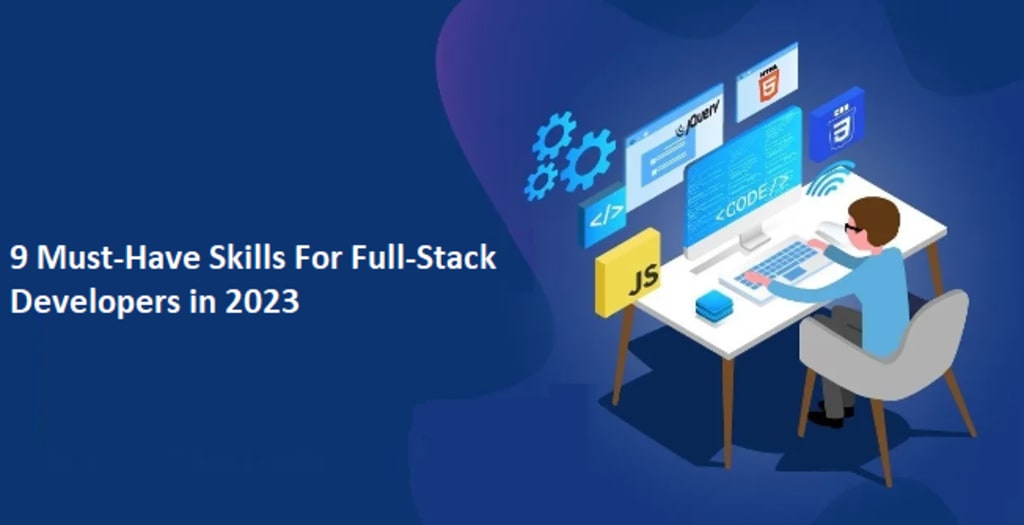
As technology advances rapidly, the role of a full-stack developer has become increasingly important in the software industry.
Full-stack developers are proficient in frontend (client-side) and backend development (server-side), meaning they can build and maintain the complete web development stack.
Due to their diverse set of skills, full-stack developers for hire are highly sought after in the tech industry.
Full-stack developers can handle all aspects of application development, including design, development, testing, and deployment.
What Skills Should Full-Stack Developers Have?
1. Proficiency in at least one programming language
Full-stack developers should be proficient in at least one programming language, such as Python, Java, or C++. This will allow them to create an interactive, intuitive, and engaging frontend for web applications.
HTML is used to define the structure of web pages, while CSS is used for styling and personalization.
JavaScript, an object-oriented scripting language, is used for adding behavior using HTML and is essential for frontend and backend web development. Therefore, it is also recommended to have knowledge of new frameworks, libraries, and tools for JavaScript.
2. Experience with frontend technologies
In addition to backend development, full-stack developers must also understand frontend technologies such as HTML, CSS, and JavaScript.
Frontend technologies are essential for creating web applications' interactive and user-friendly interfaces. They are responsible for the look and feel of the application and its overall usability and accessibility. Frontend technologies constantly change, and staying current on the latest trends, and best practices are crucial for creating web applications. They also play a crucial role in search engine optimization (SEO). It helps improve the application's visibility in search engines, loading speed, and overall performance.
Frontend technologies are used to build the user interface of a web application, and a full-stack developer should be able to use them to create visually appealing and user-friendly websites and applications.
3. Familiarity with database management
Full-stack developers should also be familiar with database management systems, either relational databases like SQL, MySQL, and PostgreSQL or non-relational databases like MongoDB, Apache Cassandra, and NoSQL, for managing data structure. In addition, it is important to know about database design and manipulation and the ability to write queries to extract and store data.
Also, as web applications grow and more users access the application, the database can become a bottleneck if not optimized properly.
Having a full-stack development company, a developer should have a good understanding of optimizing the database's performance, such as indexing and caching.
4. Knowledge of version control systems
As a full-stack developer, it's essential to have a solid understanding of version control systems. Full-stack developers should be familiar with version control systems such as Git, which allow them to track changes to their code and collaborate with other developers.
Version control systems like Git provide a central repository for your code. This means that multiple developers can work on the same codebase at the same time without conflicts. Version control systems also allow you to track the changes made to your code over time. For example, you can see who made changes to a particular file, when they were made, and what the changes were. This is incredibly useful for debugging and troubleshooting issues with your code.
Additionally, version control systems provide an easy way to collaborate with other developers. You can easily share your code with others and merge changes from different developers into a single codebase. This is especially useful when working on open-source projects, where multiple developers from different locations can work together on the same code.
5. Ability to work with APIs
Full-stack developers should have experience working with application programming interfaces (APIs), allowing different software systems to communicate. They should know how to design and implement APIs, as well as how to use APIs to integrate different systems.
APIs allow you to connect your web application to a wide range of external services and data sources. With the correct use of API, a developer can make applications much more useful and engaging for users. In addition, APIs are a great way to collaborate with other developers.
You can use an API to share data or functionality with other developers, who can then use this data or functionality to build their own applications. This can create a vibrant ecosystem of interconnected applications and services. They should know how to design and implement APIs, as well as how to use APIs to integrate different systems.
6. HTTP and REST
Full-stack developers should have a deep understanding of HTTP and REST, as they are crucial for building web applications that are fast, reliable, and easy to use. These technologies are the backbone of the modern web and transfer data between web servers and clients.
HTTP, or Hypertext Transfer Protocol, is the protocol used to transfer data between web servers and clients and is essential for developers to know how to use HTTP methods like GET, POST, PUT, and DELETE to retrieve and update data on the server.
REST, or Representational State Transfer, is an architectural style built on top of HTTP, which uses RESTful web services to create, read, update, and delete resources on the server.
7. Use of Monitoring Tools
Also, for full-stack developers, the use of monitoring tools is crucial to ensure the performance and reliability of web applications. These tools allow developers to track the application's performance in real-time by quickly identifying issues such as slow response time or high error rates.
The monitoring tools also help developers to identify any trends or patterns that may be affecting the performance over a period of time. In addition, these tools can track the error rate of your application and provide detailed information about the causes of the errors, which can help the developer troubleshoot and debug the web applications.
8. Good problem-solving skills
Full-stack developers often face complex problems that require them to think creatively and develop innovative solutions. Therefore, full-stack developers need to have strong problem-solving skills and be able to troubleshoot issues that arise during the development process.
Since full-stack developers often work with different technologies and programming languages, good problem-solving skills allow them to identify the root cause of an issue and come up with the best solution.
The problem-solving skills allow them to quickly identify and solve problems, adapt to new technologies, and work effectively with other teams, all of which ultimately contribute to the success of a project.
9. Communication skills
A full-stack developer must have good communication skills because they play a critical role in the software development process. In addition, this skill is necessary for clear and effective collaboration within a development team.
Full-stack developers normally work with other developers, project managers, and stakeholders to understand requirements, identify and solve problems, and build and deploy software.
Full-stack developers must have strong communication skills and communicate their ideas and solutions effectively to non-technical team members.
Key Takeaway
Full-stack developers are highly skilled professionals who play a crucial role in developing web applications.
To excel in this field, full-stack developers must possess diverse skills, from frontend development to backend development and from database management to version control.
Having a strong knowledge of HTML, CSS, JavaScript, and at least one programming language like Python or JavaScript is essential. Additionally, understanding the basics of database management, version control systems, and working with APIs and monitoring tools are also crucial. These skills will help you to build web applications that are fast, reliable, and engaging for users.
With these skills, you will be able to create powerful and versatile web applications that meet the needs of clients and users.






Comments
There are no comments for this story
Be the first to respond and start the conversation.